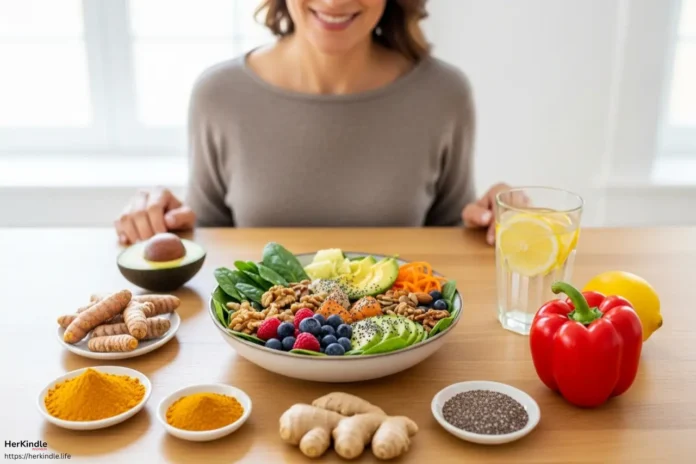Understanding the Anti-Inflammatory Diet: A Path to Wellness
Chronic inflammation is a significant contributor to many prevalent health issues, including cardiovascular disease, diabetes, arthritis, and certain cancers. While pharmaceutical treatments can help, they sometimes bring unwanted side effects. An effective natural approach gaining attention is the anti-inflammatory diet, a dietary pattern that harnesses the powers of specific foods to combat inflammation and promote overall health.
This comprehensive guide explores the benefits of the anti-inflammatory diet, the key foods that fight inflammation, its impact on gut health, and how compounds like omega-3 fatty acids and curcumin contribute to these effects.
What is an Anti-Inflammatory Diet?
An anti-inflammatory diet focuses on consuming whole, minimally processed foods rich in bioactive compounds that work synergistically to reduce chronic inflammation. Core components include fruits, vegetables, whole grains, nuts, seeds, legumes, healthy oils, and moderate amounts of fish and poultry.
Key Bioactive Nutrients
- Polyphenols: Found in peanuts, grapes, olive oil, berries, and cruciferous vegetables, these compounds modulate inflammatory pathways and support DNA repair mechanisms.
- Omega-3 Fatty Acids: Present in fatty fish like salmon, as well as nuts and seeds, omega-3s reduce pro-inflammatory eicosanoids and promote inflammation resolution.
- Curcumin: The active compound in turmeric, curcumin exhibits potent antioxidant, anti-inflammatory, and anti-carcinogenic properties.
- Prebiotics: Dietary fibers found in garlic, onions, asparagus, and legumes foster a healthy gut microbiome essential for regulating inflammation.
Foods That Fight Inflammation
Including a variety of these foods daily can naturally counterbalance the inflammatory processes in the body:
Fruits and Vegetables
- Blueberries, apples, leafy greens: Rich in antioxidants and polyphenols that neutralize free radicals.
- Citrus fruits and bell peppers: Provide high vitamin C levels to support antioxidant defenses.
- Cruciferous vegetables (broccoli, cauliflower): Contain compounds like sulforaphane that reduce inflammatory cytokines.
- Deeply colored vegetables (carrots, tomatoes, kale): High in carotenoids and flavonoids.
Nuts and Seeds
- Walnuts, almonds, flax, chia, hemp seeds: Excellent sources of healthy fats, vitamin E, and plant-based omega-3 fatty acids that compete with pro-inflammatory omega-6s.
Healthy Oils
- Extra virgin olive oil: Contains polyphenols such as oleocanthal, which mimic anti-inflammatory drugs like ibuprofen.
Protein Sources
- Fatty fish: Salmon, sardines, mackerel provide EPA and DHA—key omega-3 fatty acids.
- Plant-based proteins: Beans, lentils, and soy provide fiber and protein that support gut and systemic health.
Spices
- Turmeric (curcumin), ginger, garlic: Traditional anti-inflammatory spices with antioxidant effects.
Foods to Limit or Avoid
Certain foods are linked to promoting inflammation and should be limited:
- Red and processed meats
- Refined carbohydrates (white bread, pasta)
- Commercial baked goods and ultra-processed snacks
- Sugar-sweetened beverages
- Excessive saturated fats and omega-6-rich oils like soybean or corn oil
The Gut Microbiome and Inflammation
Emerging science shows a profound connection between the gut microbiome and systemic inflammation. The microbiome — the trillions of bacteria living in the digestive tract — influences immune responses and can either promote or reduce inflammation depending on its composition.
Role of Dietary Fiber and Prebiotics
High-fiber diets promote the growth of beneficial bacteria that produce short-chain fatty acids (SCFAs) such as butyrate. SCFAs strengthen the intestinal barrier, regulate immune cells, and suppress pro-inflammatory cytokines.
Effects of Dysbiosis
An imbalance or reduction in beneficial gut bacteria (dysbiosis) is linked to conditions like inflammatory bowel disease, metabolic syndrome, and autoimmune diseases. Diets low in fiber and high in saturated fats or processed foods can promote dysbiosis, increasing intestinal permeability (“leaky gut”) and systemic inflammation.
Therapeutic Potential
Modifying dietary patterns to include prebiotic fibers, probiotic foods, and anti-inflammatory nutrients supports a balanced gut microbiome, thereby reducing chronic inflammation and associated disease risks.
The Mediterranean and DASH Diets: Anti-Inflammatory Eating Patterns
Two widely studied dietary patterns demonstrate strong anti-inflammatory effects:
Mediterranean Diet
- Emphasizes fruits, vegetables, whole grains, legumes, nuts, and olive oil.
- Includes moderate fish and poultry; limited red meat and sweets.
- Rich in omega-3 fatty acids, polyphenols, fiber, and antioxidants.
- Supported by studies showing reduced inflammatory markers, enhanced cardiovascular and metabolic health, and potential benefits for neurodegenerative and autoimmune conditions.
DASH Diet
- Designed to lower blood pressure but also reduces inflammation.
- Focus on fruits, vegetables, whole grains, lean proteins, and low-fat dairy.
- Limits sodium, saturated fat, and added sugars.
Both diets can be adapted for vegetarians and emphasize whole, nutrient-dense foods over processed ones.
Spotlight on Key Anti-Inflammatory Compounds
Omega-3 Fatty Acids
EPA and DHA in fatty fish compete with arachidonic acid, reducing the production of pro-inflammatory eicosanoids. They also promote the generation of specialized pro-resolving mediators that actively resolve inflammation.
Curcumin
This polyphenol from turmeric regulates inflammatory pathways, including the NF-κB pathway, reducing pro-inflammatory cytokines. Despite some bioavailability challenges, combining curcumin with black pepper enhances absorption, making it an effective dietary anti-inflammatory agent.
Polyphenols
Found abundantly in fruits, vegetables, nuts, and olive oil, polyphenols have potent antioxidant and enzyme-inhibiting activities that suppress inflammation at multiple biochemical levels.
Practical Tips for Incorporating an Anti-Inflammatory Diet
- Increase vegetable and fruit intake to 6-9 servings daily, emphasizing color variety.
- Replace refined grains with whole grains such as oats, quinoa, and brown rice.
- Use extra virgin olive oil as the main cooking fat.
- Include fatty fish like salmon or sardines 2-3 times per week.
- Add nuts, seeds, and legumes as snacks and protein sources.
- Incorporate spices like turmeric, ginger, and garlic regularly.
- Limit processed and sugary foods to reduce pro-inflammatory triggers.
- Stay hydrated with water, green tea, and herbal teas.
- Consider probiotics and prebiotic-rich foods to support gut health.
Even gradual adoption of these strategies can lead to meaningful reductions in inflammation and risk for chronic disease.
Clinical Evidence and Benefits
Studies show that anti-inflammatory diets significantly reduce biomarkers such as C-reactive protein and improve risk factors for cardiovascular disease and diabetes. Patients with chronic inflammatory conditions often experience symptom relief and improved quality of life through consistent dietary changes.
Healthcare providers increasingly emphasize dietary counseling to help individuals optimize their eating patterns for inflammation management and disease prevention.
Conclusion
The anti-inflammatory diet offers a scientifically supported, natural approach to mitigate chronic inflammation and promote overall wellness especially relevant for women aged 35 and older in North America. By focusing on whole, nutrient-dense foods rich in omega-3 fatty acids, polyphenols, vitamins, and fiber, this diet supports gut health, reduces harmful inflammatory responses, and lowers the risk of many chronic diseases.
Adapting to this lifestyle entails enhancing your grocery list with diverse fruits and vegetables, healthy fats like extra virgin olive oil, fatty fish, nuts, and spices like turmeric — all while minimizing processed foods and pro-inflammatory ingredients. The gut microbiome’s health is a critical mediator in this process, which reinforces the importance of dietary fiber and prebiotics.
Take the first step toward reducing inflammation today by making mindful food choices that nourish your body and support long-term health.
FAQs
Q1: What are the top foods recommended in an anti-inflammatory diet?
A: Foods high in antioxidants and polyphenols — such as blueberries, leafy greens, nuts, fatty fish (salmon, sardines), extra virgin olive oil, and spices like turmeric and ginger — are key components.
Q2: How do omega-3 fatty acids reduce inflammation?
A: Omega-3s modulate inflammatory pathways by competing with pro-inflammatory fatty acids in cell membranes and produce specialized mediators that actively resolve inflammation.
Q3: Can the anti-inflammatory diet improve gut health?
A: Yes, by including fiber-rich prebiotic foods, it fosters beneficial gut bacteria growth, strengthens the intestinal barrier, and reduces systemic inflammation.
Q4: Is turmeric effective as a supplement or should it be consumed as a food?
A: While supplements exist, consuming turmeric as part of a whole foods diet with black pepper for enhanced absorption is recommended for natural anti-inflammatory benefits.
Q5: How quickly can one expect to see benefits from an anti-inflammatory diet?
A: Improvements in inflammation markers and symptoms can occur within weeks to months but consistent long-term adherence yields the best results and chronic disease prevention.







